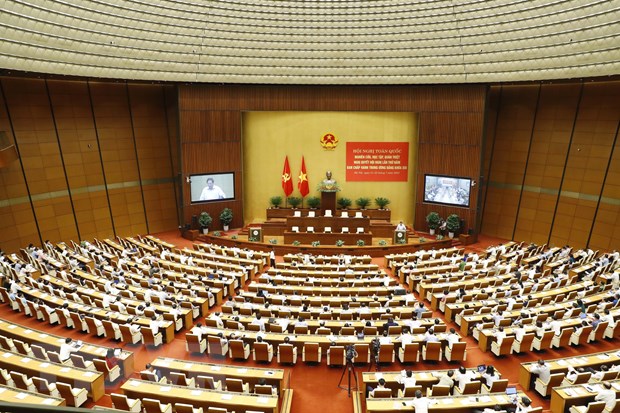 Politics & Law
Politics & Law


|
| Prime Minister Phạm Minh Chính has emphasised the important role the State plays in land management at a conference on Thursday. VNA/VNS Photo |
HÀ NỘI – Prime Minister Phạm Minh Chính has emphasised the important role the State plays in land management at a national conference on a resolution recently passed on the issue.
Speaking at the conference, Prime Minister Chính said the matter is difficult, complex and sensitive due to influences from the past, religion, ethnicity, socio-economic status, culture, defence and international concern.
In June, Resolution 18-NQ/TW was issued by the fifth plenum of the Party Central Party, regarding: "Renovating and perfecting institutional mechanisms and policies, improving the effectiveness and efficiency of land management and use, and creating a driving force for our country to become a high-income developed country".
Prime Minister Chính summarised several main contents in a presentation, outlining the fundamental factors for building and perfecting land institutional mechanisms, the urgency of continuing to innovate, perfect institutions and policies, and improving the effectiveness of land management.
Chính said in the programme for building the country in the transition period, the three important tasks are building a socialist democracy, collective intelligence and combining national strength.
Mentioning strategic breakthroughs in institution building, including in land, human resources and strategic infrastructure, Chính said that these issues are all related to the matter of land.
He said land management is a "very complicated" issue that needs to be studied in a comprehensive manner.
"Many people get rich thanks to the land, many others become poor because of land. There is disunity and wrongdoings that stem from the land,” he said.
He reiterated the need to stick to reality in drafting and issuing policies.
The Prime Minister also mentioned the fact that many localities allow real estate trading with areas of land in good locations, while these areas should be used for production and manufacturing to create jobs.
"First of all, we must create jobs from the land, not giving priority to real estate trading,” Chính said.
Resolution 18-NQ/TW
The Resolution affirms the Party's cross-cutting view on land; that it belongs to the entire people and the State is the representative of the people and is tasked with land management.
The new point of this Resolution is to clarify more clearly the role of the State as the representative of the "land owner" and the connotation and meaning of the ownership of land while setting out new requirements for publicity, transparency and accountability in land acquisition.
The resolution means that higher tax rates are imposed on those using large areas of land or owning multiple real estate properties, those speculating on land, failing to put land to use as scheduled, or leaving land idle.
The Party Central Committee also urged relevant bodies to build laws and policies on land tax with reference to international norms, but suitable to the domestic market development and conditions, with a feasible roadmap.
A fully-fledged legal corridor for the real estate market must be established, with the land use rights to be strongly commercialised. There must be policies to develop the market for land use rights, especially the market for farmland leasing, according to the resolution.
While stressing the need to apply higher taxes in such a way as to prevent speculation on real estate, the Party Central Committee also demanded preferential land taxes and fees for poverty-stricken areas, including for the poor and ethnic minority groups.
The Party stated that people’s land use rights are protected by law, but reiterated that the land use rights are not the rights to ownership. Still, specific rules must be issued to protect the legitimate rights of land users and to prevent land-related corruption and inappropriate retraction of people’s land use rights.
According to the resolution, land can only be redeemed after schemes for compensation, support and resettlement are approved. For certain specific cases, resettlement must be done before the land is retracted, to ensure that the affected people have a decent living place with equal or better conditions than their old places.
The Party Central Committee requires that amendments to the 2013 Land Law and some related laws be completed in 2023. By 2030, a synchronous legal system must be completed to prevent the wastefulness of land and to settle all land disputes that have been protracted due to historical reasons. VNS




